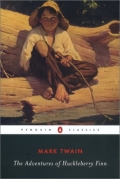
I’ve never read much of Mark Twain’s stuff. I vaguely remember reading A Conneticut Yankee in King Arthur’s Court in college and I think I was probably SUPPOSED to read The Adventures of Tom Sawyer at some point in school, but this was the first time I had ever picked up what’s supposed to be his greatest work, Adventures of Huckleberry Finn. I wish I had done so sooner, because it was great.
If you’re somehow unfamiliar with the basic premise, Huckleberry Finn follows the adventures of the eponymous country boy from Missouri as he encounters trouble at home and then decides to run away via the mighty Mississippi River. Along the way he pairs up with an escaped slave named Jim and encounters all kinds of murderers, thieves, aristocrats, and swindlers. The plot summary sounds kind of like a pulp adventure story, and I admit there is a lot of that. I can see why kids –especially boys– would be attracted to this book.
But the mark of a really good book is that it has so much literary machinery whirring and grinding below the surface that you’re constantly thinking back on it, days or weeks or months after you’ve finished reading it. The most striking thing to me after the authentic representation of dialects was what a master of irony Twain was. It’s everywhere in this book: from Tom Sawyer telling Huck that he had to let his foster parents civilize him before he could join Tom’s (imaginary) band of cutthroat robbers, to Huck’s saying that he’s sorely disappointed in the quality of Tom’s morals after the other boy agrees to help Huck free the captured runaway slave Jim. It’s the same kind of juxtaposition and stinging irony that modern writers of shows like The Daily Show employ. The book is rarely laugh out loud funny, but I sure grinned a lot.
I also really love the character of Huck Finn, and I can see why he’s so timeless. Huck is undoubtedly a thirteen year old country boy –he’s uncouth, he’s uneducated, and he’s lazy. But he’s also really intelligent, kind, clever, independent, and has no problem following his own moral compass even when it leads him against the grain of society and those supposedly better than him. Well, eventually. Like any thirteen year old boy he gets swept up among the actions of his elders, but he rarely hesitates for long before correcting his own course.
I also loved how Twain contrasted the characters of Huck and Tom Sawyer. Both are young boys who are smart and clever, but beyond that Tom is everything Huck is not. Tom needlessly complicates everything while Huck is much more pragmatic and direct. Tom adheres zealously to the rules governing any situation –gleaned in his case from adventure stories about pirates, robbers, and prison escapees– while Huck is willing to question authority and come around to his own decisions about what’s right. Tom lets his adherence to the rules and his desire to do things “right” lead him into inadvertent cruelty, while Huck will actually endanger himself and break the rules in order to help other people directly. It’s great stuff.
So, you probably don’t need me to tell you that this is an example of some of the best American literature to date given its status and how ingrained it has become in our culture. But don’t let that dissuade you from checking it out.
You know, I’ve never read Huck Finn either, and I should. Maybe I will make that my Christmas reading this year–you make it sound like a great read.
Yep, I liked it quite a bit.